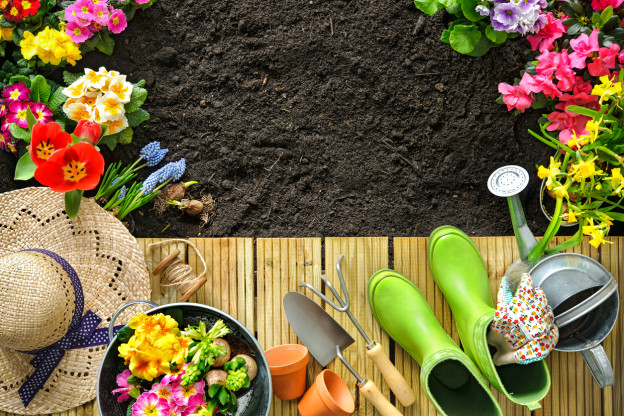Have you always been interested in starting your own garden but you don’t know where to start? Do you dream of pottering around in your own garden but lack the experience to feel confident outdoors? As the season of new beginnings, spring is the perfect time to cast aside your doubts to begin your gardening adventure.
At Bury Hill, we have compiled a list of our 5 favourite tips, from choosing a layout to caring for and maintaining your garden, to help gardening beginners blossom into experts.
1.Plan your layout before you begin
There are a number of factors to consider before going to the garden centre to buy flowers and shrubs. By planning in advance, you can cut down on extra costs, avoid impulse purchases and select plants that are suitable for your soil type and levels of light in your garden.
What you should do before going to the garden store:
-
Research the various types of gardens to find one you would like to recreate
-
Create a sketch drawing of a layout for your garden
-
Set a budget to avoid impulse spending
2.Select the right plants
With a design layout in mind, it’s time to consider your what type of plants you would like to grow in your garden. This may seem like a simple task based on colour preferences and flower types, but there are a variety of other factors you need to consider, such as:
-
Season: The time of year will affect your plant selection. For more information on preparing your garden for spring and summer, plants for each season, take a look at top tips gardener’s guide.
-
Soil: The type of soil you have naturally or import into your garden plays a bigger role in plant selection than you might think. Factors such as Ph levels, aeration, drainage and minerals influence the type and quantity of flowers you can grow.
To boost the health of your soil and encourage plant growth, mix a high-quality soil conditioner into your topsoil.
-
Resistance to disease and parasites: Many plants can resist diseases and parasites that affect their health and growth life. To avoid complications with more disease-prone flowers and plants, look for those with higher resistance.
3. Invest in the right equipment and tools
As a beginner gardener, it is worth investing in necessary gardening tools to make gardening tasks easier. There are an endless supply of tools available, but not all of them are necessary for beginner gardeners. We recommend the following:
-
Gloves: A basic necessity for all gardeners. Not only will they protect your hands from scrapes and cuts, they will also prevent you from getting infections.
-
Hand trowel: This useful tool has many uses, from moving plants, composting and weeding. It is a must-have for all beginner gardeners.
-
Spade: A durable spade is mandatory for digging larger plots and planting shrubs and trees.
-
Rake: A necessary garden tool to help with garden maintenance, removing fallen leaves and loosening soil.
4. Garden Maintenance
Arguably one of the most important steps for all gardeners, maintenance ensures your plants stay healthy, whilst reducing competition for nutrients and light sources.
-While there are a variety of steps you can do to keep your garden in top condition, we have found the following to be absolutely mandatory:
-Water plants 1-2 times per week to ensure enough moisture reaches your plants and flowers. Naturally, the amount and frequency of watering will change depending on the season.
-Use mulch to reduce the growth of weeds in your garden. When spread over the surface of your soil, it acts as a protective barrier to retain moisture, prevent weeds and maintain ideal soil temperature.
-Weeds are an unwanted but unavoidable feature of every garden. By regularly removing weeds from their source, however, you can prevent them becoming an even bigger problem.
Enjoy the work you have done in your garden
You have invested a lot of time and energy into creating the garden you have always wanted, now it’s time to enjoy it.
We recommend:
-Investing in garden furniture so you can spend afternoons reading in your garden.
-Sharing seeds and clippings from your favourite plants with friends so they can grow them in their garden.
-Taking photos of the various stages of your plants and flowers in bloom to track progress.
-Helping friends and family by sharing tips and advice that has worked for you.
Looking for more gardening advice?
Are you a complete beginner or a more experienced gardener? Follow Bury Hill’s blog for more tips and advice on how to create and maintain your perfect garden.
